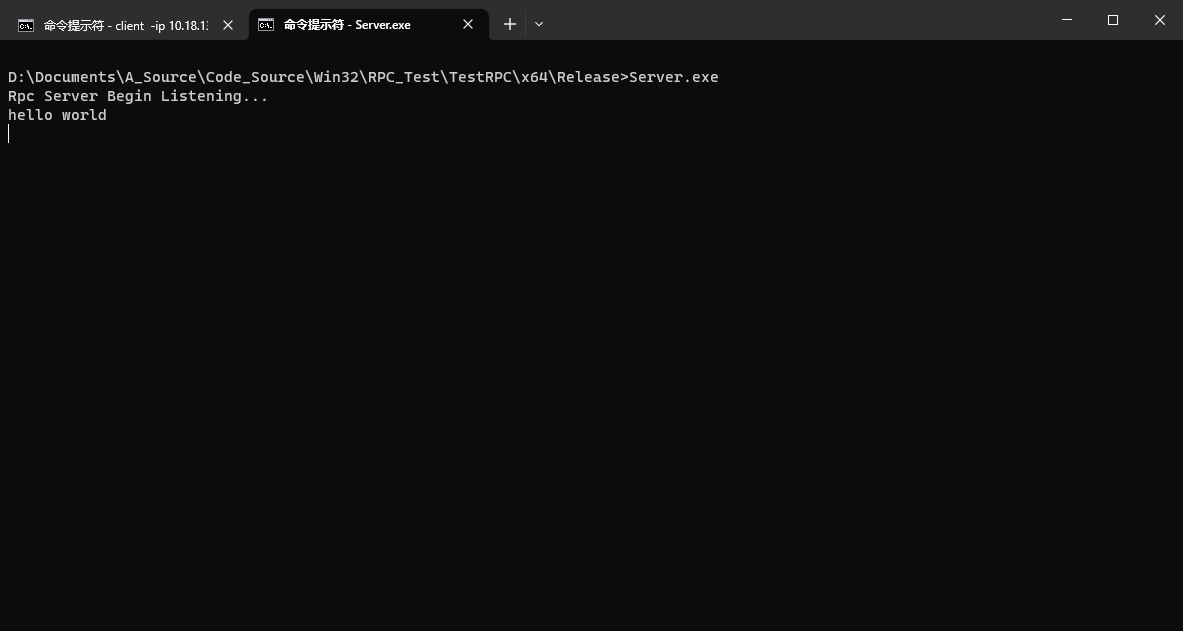概述:windows 创建 RPC调用过程实例详解
[toc]
0x01、生成 UUID 和模版(IDL)文件
定义接口的第一步是使用 uuidgen 实用工具生成通用唯一标识符(UUID)。UUID使客户端和服务端能够相互识别。该工具包含在阿庄平台软件开发工具包中(SDK)。
一般安装路径位于:D:\Windows Kits\10\bin\10.0.22621.0\x64
以下命令生成 UUID 并创建名为 Hello.idl 的模版文件。
模版内容大致如下:
1
2
3
4
5
6
7
8
| [
uuid(7a98c250-6808-11cf-b73b-00aa00b677a7),
version(1.0)
]
interface hello
{
}
|
在模版中添加接口:
1
2
3
4
5
6
7
8
9
10
| //file hello.idl
[
uuid(7a98c250-6808-11cf-b73b-00aa00b677a7),
version(1.0)
]
interface hello
{
void HelloProc([in, string] unsigned char * pszString);
void Shutdown(void);
}
|
0x02、添加 acf 文件
acf文件内容如下所示,导出接口需要与 idl 文件一致:
1
2
3
4
5
6
7
| //file: hello.acf
[
implicit_handle (handle_t hello_IfHandle)
]
interface hello
{
}
|
0x03、编译 idl 文件
-
打开 visual studio,新建一个空项目
-
空项目中添加上述 idl文件 和 acf文件
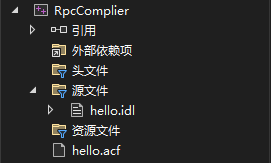
-
编译项目
-
生成 hello_h.h、hello_c.c、hello_s.c
- hello_h.h: 服务端和客户端共用文件
- hello_c.c: 客户端文件
- hello_s.c: 服务端文件
需要补充说明的是,在 hello_h.h 头文件中有两个导出接口,导出接口即为rpc调用的接口。
1
2
| extern RPC_IF_HANDLE hello_v1_0_c_ifspec;
extern RPC_IF_HANDLE hello_v1_0_s_ifspec;
|
包含函数
函数MIDL_user_allocate和MIDL_user_free用于为RPC存根分配和释放内存。
MIDL_user_allocate和MIDL_user_free在实现RPC应用程序时,它们必须在应用程序的某个地方定义,这里直接在主文件定义即可。
1
2
3
4
5
6
7
8
9
10
|
void __RPC_FAR* __RPC_USER midl_user_allocate(size_t len)
{
return(malloc(len));
}
void __RPC_USER midl_user_free(void __RPC_FAR *ptr)
{
free(ptr);
}
|
0x04、客户端
新建工程文件如下所示:
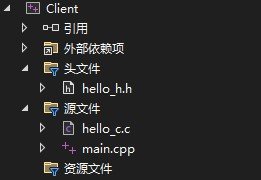
clientrpc.cpp
1
2
3
4
5
6
7
8
9
10
11
12
13
14
15
16
17
18
19
20
21
22
23
24
25
26
27
28
29
30
31
32
33
34
35
36
37
38
39
40
41
42
43
44
45
46
47
48
49
50
51
52
53
54
55
56
57
58
59
60
61
62
63
64
65
66
67
68
69
70
71
72
73
74
75
76
77
78
79
80
81
82
83
84
85
86
87
88
89
90
91
92
93
|
#include <iostream>
#include <string>
using namespace std;
#include "hello_h.h"
#pragma comment(lib,"Rpcrt4.lib")
void doRpcCall();
int main(int argc, char** argv)
{
int i = 0;
RPC_STATUS status = 0;
unsigned char* pszNetworkAddr = NULL;
unsigned char* pszStringBinding = NULL;
for (i = 1; i < argc; i++) {
if (strcmp(argv[i], "-ip") == 0) {
pszNetworkAddr = (unsigned char*)argv[++i];
break;
}
}
status = RpcStringBindingCompose(NULL,
(unsigned char*)"ncacn_np",
pszNetworkAddr,
(unsigned char*)"\\pipe\\hello",
NULL,
&pszStringBinding);
if (status != 0) {
cout << "RpcStringBindingCompose returns: " << status << "!" << endl;
return -1;
}
cout << "pszStringBinding = " << pszStringBinding << endl;
status = RpcBindingFromStringBinding(pszStringBinding, &hello_IfHandle);
if (status != 0) {
cout << "RpcBindingFromStringBinding returns: " << status << "!" << endl;
return -1;
}
doRpcCall();
status = RpcStringFree(&pszStringBinding);
if (status != 0)
cout << "RpcStringFree returns: " << status << "!" << endl;
status = RpcBindingFree(&hello_IfHandle);
if (status != 0)
cout << "RpcBindingFree returns: " << status << "!" << endl;
cin.get();
return 0;
}
void doRpcCall(void)
{
char buff[1024];
RpcTryExcept{
while (true) {
cout << "Please input a string param for Rpc call:" << endl;
cin.getline(buff, 1023);
if (strcmp(buff, "exit") == 0 || strcmp(buff, "quit") == 0) {
Shutdown();
}
else {
HelloProc((unsigned char*)buff);
cout << "call helloproc succeed!" << endl;
}
}
}
RpcExcept(1) {
unsigned long ulCode = RpcExceptionCode();
cout << "RPC exception occured! code: " << ulCode << endl;
}
RpcEndExcept
}
void* __RPC_USER MIDL_user_allocate(size_t len)
{
return (malloc(len));
}
void __RPC_USER MIDL_user_free(void* ptr)
{
free(ptr);
}
|
0x05、服务端
新建工程文件如下所示:
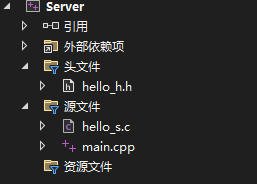
serverrpc.cpp
1
2
3
4
5
6
7
8
9
10
11
12
13
14
15
16
17
18
19
20
21
22
23
24
25
26
27
28
29
30
31
32
33
34
35
36
37
38
39
40
41
42
43
44
45
46
47
48
49
50
51
52
53
54
55
56
57
58
59
60
61
62
63
64
65
66
67
68
69
70
71
72
73
74
75
76
77
78
79
80
81
| #include <iostream>
using namespace std;
#include "hello_h.h"
#pragma comment(lib,"Rpcrt4.lib")
int main(void)
{
RPC_STATUS status = 0;
unsigned int mincall = 1;
unsigned int maxcall = 20;
status = RpcServerUseProtseqEp(
(unsigned char*)"ncacn_np",
maxcall,
(unsigned char*)"\\pipe\\hello",
NULL);
if (status != 0) {
cout << "RpcServerUseProtseqEp returns: " << status << endl;
return -1;
}
status = RpcServerRegisterIf(
hello_v1_0_s_ifspec,
NULL,
NULL);
if (status != 0) {
cout << "RpcServerRegisterIf returns: " << status << endl;
return -1;
}
cout << "Rpc Server Begin Listening..." << endl;
status = RpcServerListen(mincall, maxcall, FALSE);
if (status != 0) {
cout << "RpcServerListen returns: " << status << endl;
return -1;
}
cin.get();
return 0;
}
void* __RPC_USER MIDL_user_allocate(size_t len)
{
return (malloc(len));
}
void __RPC_USER MIDL_user_free(void* ptr)
{
free(ptr);
}
void HelloProc(unsigned char* szhello)
{
cout << szhello << endl;
}
void Shutdown(void)
{
RPC_STATUS status = 0;
status = RpcMgmtStopServerListening(NULL);
if (status != 0) {
cout << "RpcMgmtStopServerListening returns: " << status << "!" << endl;
}
status = RpcServerUnregisterIf(NULL, NULL, FALSE);
if (status != 0) {
cout << "RpcServerUnregisterIf returns: " << status << "!" << endl;
}
}
|
0x06、编译并运行
分别编译客户端和服务端程序,得到 server.exe 和 client.exe
- 先运行 server.exe
- 在 client.exe 目录运行
client -ip 192.168.106.128 来启动客户端程序并与服务器端相连
- 在 client 的窗口输入任意字符串,回车后可看到server窗口上有显示
- 在 client 窗口内 输入 exit 或 quit, server 窗口关闭
0x07、运行示例
Client
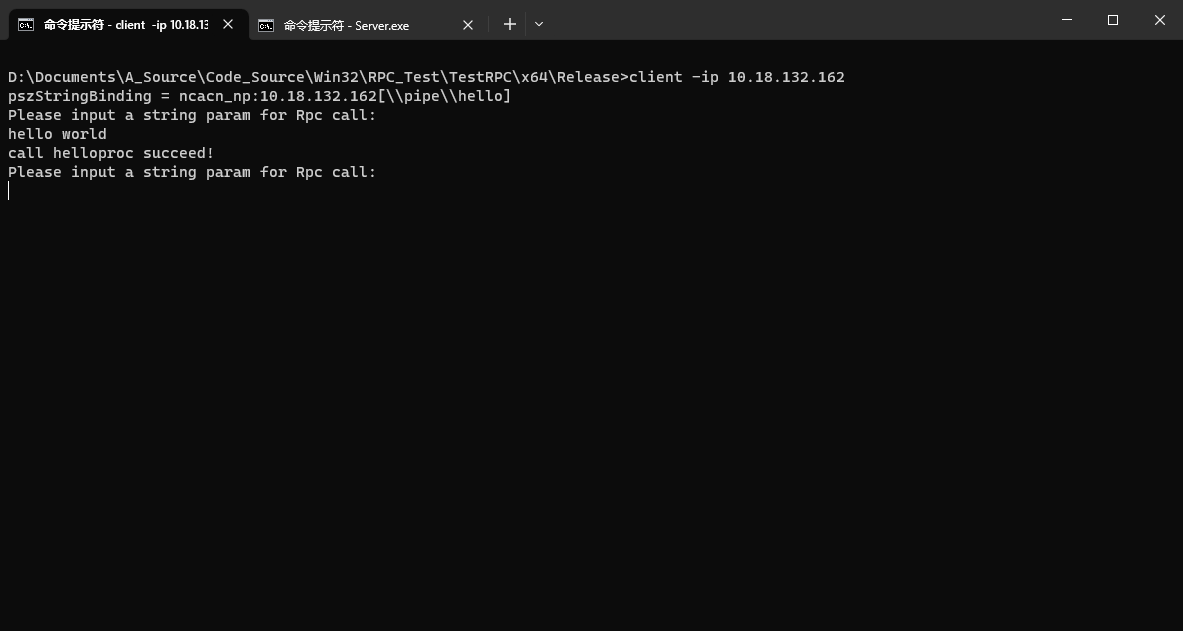
Server
